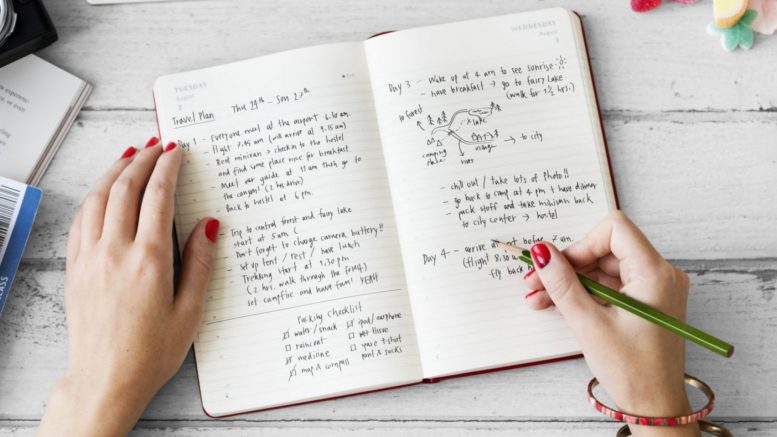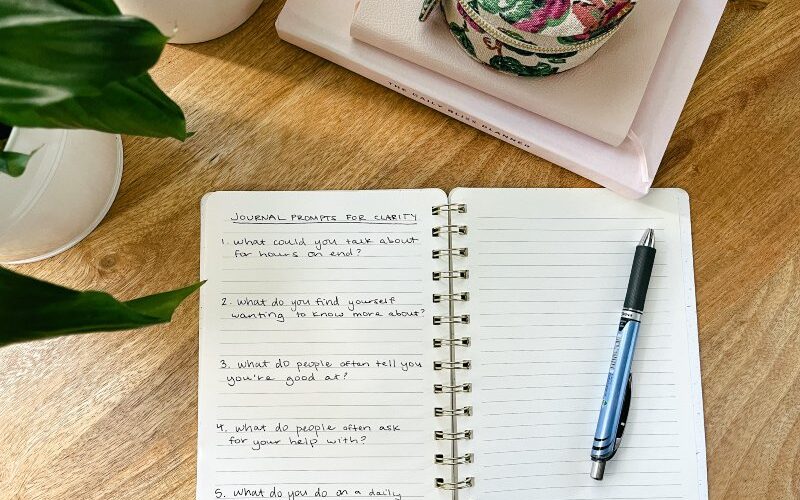Most times, during our healing journey, we are advised to pen down our thoughts, feelings, or routines as a means of self-development. Journaling quiets our minds and helps us make sense of our thoughts. When I first started, it was confusing because I kept wondering how to go about it. A friend of mine began to send questions to me as a guide, and I was expected to answer them in my journal.
Now, these questions are what we call journal prompts, which are guides used in journaling. They help you channel your thoughts and give you a sense of direction. Sometimes, we tend to forget that writing doesn’t have to be gripping or impressive, especially in journaling. In this article, I will provide journal prompts that will clarify your mental health journey.
Key Takeaways
- There is no right or wrong way to journal. You may like to journal first thing in the morning to prepare for the day, while others prefer to write at night as part of their bedtime practice. Select a time that works best for you.
- Journal question prompts for mental health are eye-opening questions that encourage people to think, study, and express their ideas, feelings, and experiences about their mental health through writing.
- Some example of these prompts are: What do you value most in your relationships with romantic partners, friends, or family? What five traits do you value most in potential partners? Write a love letter to yourself. What are three important lessons have you learned from previous relationships?
How to Start Journal Writing

Journal Writing is a private and simple process, especially when writing for your mental health. Here are some steps to take:
1. Select the needed instruments.
The first thing you need to do is to choose a notebook or journal that appeals to you. It could be an electronic journaling platform, an app, a guided notebook with prompts, or a blank journal. Use writing instruments that you find comfortable and fun to use, such as pens or pencils.
2. Make time for it.
Whether it is in the morning, right before bed, or at a particular time of the day, figure out what time works best for you and stick to it. Seek out a peaceful, unoccupied area where you can write in your journal. Before you realize it becomes a habit. The more you journal, the more effective it gets. Try to journal on a daily basis, even if it is only for a little while. Include it in your self-care regimen and prioritize the time. Remember, you have to be intentional about it.
3. Begin with a basic writing exercise or prompt.
You can practice free writing by starting to write without following predetermined guidelines. You write about whatever you are thinking about or feeling. As an alternative, Start with a prompt that speaks to you if you are not sure where to start.
4. Write openly and honestly.
Allow yourself to be free of self-judgment and criticism while writing. Journaling is a personal exploration with no right or wrong answers—it allows you to dive into your ideas and experiences. Allow yourself to write freely and honestly about your thoughts, feelings, and experiences. Use your notebook to gain a deeper understanding of yourself.
5. Prioritize the process over the result.
While journaling, remember that it is more about the process than the outcome. Accept writing as a form of self-expression and self-care. Forget about spelling and grammar. Allow the words to come to you organically.
Different Journaling Techniques

There are different ways to Journal that will suit your taste and make things easier for you.
1. Brain Dump:
Simply put, brain dumps involve writing down everything you’re thinking. It doesn’t have to make sense; the main idea is to clear your mind of all the thoughts. This method can benefit individuals with racing thoughts because “transferring” those thoughts onto paper can slow down the brain’s rapid pace. Additionally, the writing may start to display particular patterns or common threads over time. Brain Dump can also be a helpful way to arrange your ideas and identify recurring patterns, which leads you to concentrate on the areas that require more attention.
2. Bullet Journaling:
This is another appealing option for people who are new to journaling. Just write your ideas down in bullet points as they occur; paragraphs or connected sentences are unnecessary. Also, You could just compose a list in a plain journal or on an app or buy a specific bullet journal, which usually resembles a planner.
3. Gratitude Journal:
Lastly, a gratitude journal is a simple form of journaling that you can try since it can help you focus on the good aspects of your life. Spend a few minutes at the start or end of each day writing down a few things you are thankful for, such as the wonderful weather or delicious meal you had that day.
Furthermore, There is no right or wrong type of journal to use. The best one is the one that suits your needs, whether it’s an app or website that helps you record your thoughts or a guided wellness or anxiety journal that comes with prompts.
How Do You Write in a Journal for Mental Health?
There is no right or wrong way to journal. You may like to journal first thing in the morning to prepare for the day, while others prefer to write at night as part of their bedtime practice. Select a time that works best for you.
People write things down to get them off their heads/ chests. Journaling reduces the rate of depression, anxiety, and mental stress in an individual. However, this will only work when you focus on positive things for which you are grateful. When you keep writing about negative things or swelling on negative memories, it causes harm to your mental health. It should not feel like a burden or a work. Five minutes each day is a decent starting point if you want to start small. If you want to write until you’re worn out, that’s fine. Do whatever works for you.
What are Journal Question Prompts for Mental Health?
Journal question prompts for mental health are eye-opening questions that encourage people to think, study, and express their ideas, feelings, and experiences about their mental health through writing. Also, They help you to Identify and process emotions, thoughts, and beliefs. It provides a way of developing self-awareness and proper emotional regulation. When journal prompts are properly used, they help you to have a deep understanding of yourself, develop healthy coping mechanisms, and take care of your general well-being.
Daily Journal Prompts for Mental Health

There are simple journal prompts that will help you in your writing journey. Below, I will suggest simple journal prompts that can help you in your mental health journey:
- What do you like most about your personality?
- List 5 things you’re grateful for today.
- Whom do you trust the most? Why?
- What are your strengths in friendships or relationships (e.g., kindness, empathy)?
- What boundaries could you set in your relationships to safeguard your well-being?
- What do you value most in your relationships with romantic partners, friends, or family?
- What five traits do you value most in potential partners?
- Write a love letter to yourself.
- What are three important lessons have you learned from previous relationships
- How do you show compassion to others? How can you extend that same compassion to yourself?
- I get anxious when _.
- What was one moment of joy or beauty you experienced today?
- Describe a place where you feel most relaxed and peaceful.
- What or who motivates you the most?
- What’s the most rewarding part of your work?
- What’s your favorite part of your day?
- Which parts of your daily life cause the most stress or frustration? How do you cope with them?
- Who do you want to be? What are the roles, identities, and traits that truly fit with the person you want to become?
- When and where do you feel truly seen?
- What micro-wins and micro-moments of joy did you experience today?
- Where are you currently putting your time and energy? Does this align with what matters most to you?
- Are there any thoughts or emotions that may be weighing you down or no longer serving you positively? Can you give yourself permission to release them?
- Reflecting back on your last year, what worked well for you? How can you get more of this into today?
- What are the behaviors that are bringing you closer to or further away from your desired future self?
- What parts of you need extra support right now?
Bear In mind that these prompts don’t need massive answers, Simplicity will always work out. Your input for the day must not be a lot. Also, there will be days when you do not feel like inputting anything and that is ok. Journaling is not the only form of healing and it is not measured by the amount of inputs made in a week. For more Journal Prompts, download the pdf file below.
How Do I Start a Daily Journaling Practice?
To start a daily journaling practice, follow these steps:
- Set aside time daily to journal.
- Make a comfortable space.
- Begin with a journaling prompt.
- Be consistent.
What are Journaling Exercises?
Journaling exercises are structured activities or procedures that allow you to deeply explore specific thoughts, emotions, or experiences.
What are the Rules of Journaling?
While journaling is a personal activity with no one-size-fits-all approach, the following general guidelines can improve the experience:
- Be honest with yourself. Your journal is a safe space, so be honest in your entries.
- Don’t stress about perfection. The goal is to express yourself, not to write perfect language.
- Maintain a consistent writing schedule. Even if it’s brief, consistent writing helps to preserve continuity.
- Reflect on previous entries. Revisiting earlier entries can offer insight into personal development and change.
How Does Journaling Affect the Brain?
Conclusion
I believe with the help of the provided prompts, you can begin your journaling journey with confidence and clarity. Journaling can help you manage stress, regulate emotions, and cultivate a greater sense of mindfulness. Whether addressing basic emotions or delving deeper into reflections, journaling is a powerful self-care practice that offers numerous benefits for your mental health and emotional well-being.
Related Articles
- No Motivation to Do Anything: Why and How to Deal
- Mental Illness; Top 5 Misconceptions, Causes, Treatment and Management.
- 150+ Positive Affirmations for Men 2024 (Updated)
- 20 Best Mental Health Podcasts for Finding Support 2024
- Emotional Manipulation: Know All The Manipulation Tactics






